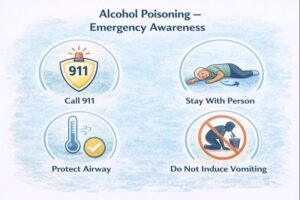Alcohol Poisoning: A Serious Medical Emergency
Why It Matters for First Aid & Public Safety
Alcohol poisoning is a life-threatening condition that can affect breathing, heart function, body temperature, and the ability to protect the airway. It can happen in social settings, workplaces hosting events, post-secondary environments, or at home.
First aid training in Canada teaches participants how to recognize emergencies, protect the airway, and activate EMS (911) when someone shows signs of severe intoxication or decreased consciousness. Early recognition saves lives.
What Alcohol Poisoning Is
Alcohol poisoning occurs when toxic levels of alcohol (ethanol) enter the bloodstream faster than the body can process it. It may occur after consuming alcohol in large quantities over a short period, or after accidental exposure to products that contain alcohol (mouthwash, extracts, cleaners, etc.).
It is always a medical emergency.
Key Signs & Symptoms

-
Confusion or disorientation
-
Repeated vomiting
-
Slow breathing
-
Irregular breathing
-
Low body temperature (cool or pale skin)
-
Unresponsiveness or inability to wake up
-
Seizures
A person does not need all symptoms for emergency services to be called. If someone cannot be awakened, they are at significant risk and require immediate help.
First Aid Priorities (Awareness Only)
If alcohol poisoning is suspected:
✔ Call 911 in Canada or local emergency services
✔ Stay with the person
✔ If vomiting, keep them upright or roll onto their side to protect the airway
✔ Do not induce vomiting
✔ Do not leave the person alone
Certified first aid training teaches how to roll a person into recovery position and monitor breathing until help arrives.
How It Happens
Common scenarios include:
-
Consuming large amounts of alcohol in a short period
-
Accidental exposure to household products containing alcohol
-
Ingestion of toxic alcohols such as methanol, isopropyl alcohol, or ethylene glycol, which require urgent medical treatment
Risk increases rapidly when quantity exceeds what the body can metabolize.
Treatment in Hospital Settings
Medical professionals may provide:
-
Oxygen support
-
Airway protection
-
Intravenous fluids
-
Medication and monitoring
-
In severe cases, dialysis for toxic alcohol exposures
Supportive care continues until the body clears the alcohol safely.
Educational Disclaimer
This article is for educational purposes only and does not replace emergency care, medical advice, or certified first aid training. For suspected alcohol poisoning, call 911 immediately in Canada.
